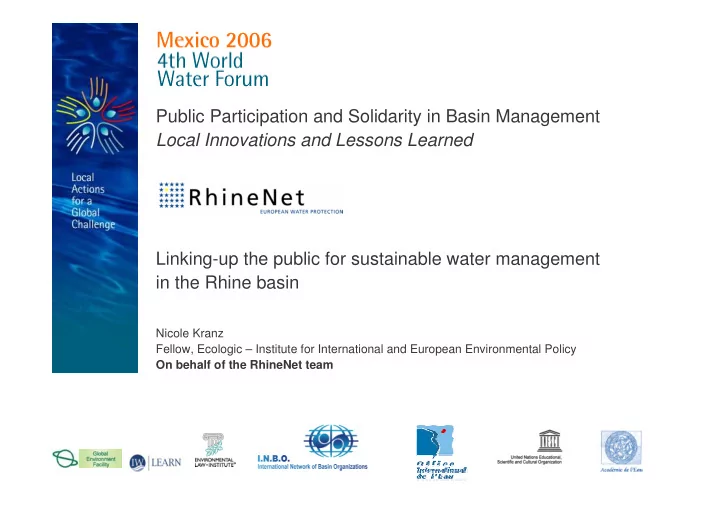

Public Participation and Solidarity in Basin Management Local Innovations and Lessons Learned Linking-up the public for sustainable water management in the Rhine basin Nicole Kranz Fellow, Ecologic – Institute for International and European Environmental Policy On behalf of the RhineNet team
RhineNet and INTERREG IIIB Interreg III B • Initiative of the European Fund for Regional Developement • Fostering collaboration of regions in the European Union in the period from 2000 – 2006 INTERREG IIIB Program Northwest-Europe • Support of transnational collaboration in Northwestern Europe with several action foci: e.g Sustainable Management of Water Resources
RhineNet Partners • Ministry for Environment and • Solidarité Eau Europe (F) ( initiator Transport of Baden- and coordinator ) Wurttemberg (D), • Naturlandstiftung Saar (D) ( lead • Office International de l'Eau (F) partner ) • Regiowasser e.V. (D) • Agglomeration Saarguemines Confluences (F) • Reinwater Foundation (NL) • Federal Association of Citizens‘ • Environment Agency of Initiatives for the Environment(D) Karlsruhe City (D) • Ecologic (D) • Environment Ministry of Saarland (D) • European Rivers Network (F) • Foundation Hëllef fir die Natur (L)
Countries in the Rhine basin The Netherlands France Germany Switzerland Luxembourg Belgium Austria Liechtenstein Italy Tributaries Main Meuse Moselle Neckar Aar
Who are the stakeholders of RhineNet? RhineNet partners – NGO, ministries, and research institutes (innovation) – Interested to link-up their activities to reach a broader audience – Exchange of ideas and approaches and learn from each other Target groups Authorities – Different levels – Benefit from best practices Broad public – Awareness raising for the protection of intact river systems – Capacity-building for active participation – Comprises many different audiences
Public Participation Tool/s & Process Innovation – Linking of various participation projects in the Rhine basin – Identification of synergies – Testing of new approaches for actively involving the broad public and stakeholders What we achieved – In-depth study of participation in the Rhine area – Information events and workshops in the basin – Development of a methodological guide for public participation at the regional and local level – Incorporation of the transboundary perspective into participation at the local level: awareness raising – Local level: consultation about the future measures to be taken in the Rhine basin – Testing of new methods: farmers’ game
Public Participation Tool/s & Process Rhine-Study: Results – Good basis for public participation in the Rhine basin – Various approaches, but not necessarily active involvement Information sessions – Development of a model concept for information sessions – Several sessions and workshops throughout the Rhine basin targeted at different audiences – Development of an educational program about public participation Guide – Part 1: Basic approaches and methods for public participation – Part 2: Approaches taken in the Rhine basin, illustration of theoretical approaches – Part 3: Lessons learnt, do’s and don’ts – Consultation: discussion fora
Awareness raising BIG JUMP 2005 – Bathing as a direct experience of intact nature and systems Rivers of Images, Streams of Words – Targeted at students, cultural aspect of water management
Lessons Learned • Public participation is important at all levels of river basin management • Different languages, different administrative approaches and cycles are a considerable barrier • Preparation for participation: training about methodologies • Initiatives need to be geared to meet the demands of the target groups • Requires that specific water culture in the basin is taken into account • International river basins call for the linking of relevant actors between countries and regions • RhineNet offers a platform and a good starting point
Transferability of our Process & Tool/s Opportunities – Strong methodological basis – Creative approaches geared to the target audience: broad public – Interlinked multi-level activities – Step-by-step approach including methodological development as well as hands-on experience Constraints – Long history of public involvement in the Rhine basin – Democratic regimes and strong institutional background – Open dialogue for a long time
Conclusions Further activities!!! – Do not stop at this stage – it is still only the beginning! – The RhineNet should continue and link up with even more initiatives throughout the basin. – Establishment of regular forum for the exchange of information and the initiation of activities. – While collaboration and interaction at the local level is working quite well, institutional obstacles in the riparian countries still need to be overcome.
Recommend
More recommend